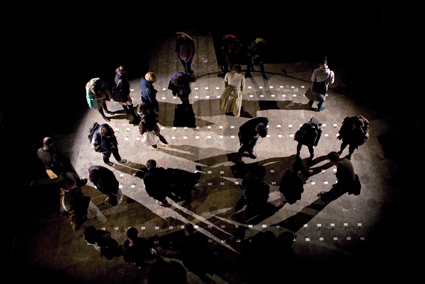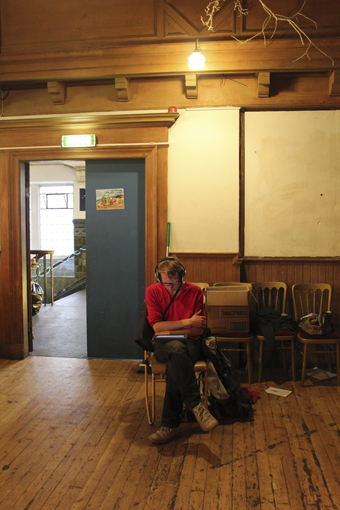art is something you do, that happens to you
emily sexton: andy field, uk writer & co-director forest fringe

Zilla!, producer Andy Field
photo Ludovic Des Cognets
Zilla!, producer Andy Field
“WHEN JOHN CAGE CREATED 4’33 HE DID SO NOT BECAUSE HE WANTED PEOPLE TO LISTEN TO FOUR MINUTES AND 33 SECONDS OF SILENCE, BUT BECAUSE HE WANTED THEM TO LISTEN TO THE WORLD WITH THE KIND OF CONCENTRATION THEY NORMALLY RESERVE FOR ART. A GOOD SPACE FOR ART IS A SPACE THAT, LIKE CAGE, IS SENSITIVE TO THE KIND OF ATTENTIVENESS THAT IT GENERATES; THE WAY IT IS INVITING PEOPLE TO LOOK.” ANDY FIELD
I first came across Andy Field through his writing. His succinct, poetic observations and rocking passion for art, artists, spaces and people connected with me, as did the assertion in his biography: “I am a giddy over-enthusiast and unashamedly so.” Conversations with Field are infused with political astuteness, intense curiosity, beautiful stories and a passion for innovation as cyclical, best informed by an historically broad perspective.
In August, I observed one component of his diverse practice first-hand, at Forest Fringe: the hot, passionate wild child within the Edinburgh Festival cacophony, which Andy Field curates, directs and produces in partnership with Canadian practitioner, Deborah Pearson.
“My practice—in whatever guise it manifests itself—is to create contexts that bring people together to produce a different experience of the world. That’s the only way I can account for running a festival, organisation and venue—and making my own work. I understand them to be fundamentally the same thing; the constantly unfolding experiment that is running and curating Forest Fringe is a form of creative practice, and the ways in which we go about that are as meaningful a kind of artmaking as the more explicit ‘shows’ that I make as an artist.” Such sentiments resonate with those of another renowned UK producer, Helen Cole, who notes, “a festival is as precarious as any artwork” (see interview RT101).
Says Field, “There is a creative resourcefulness to having to navigate your way through finance and money, that is an integral part of your art. And if you don’t appreciate that your art is being made within a given economic framework, then you’re failing at art, I think. Art is a way of doing things, not the things we have produced. And if you try and divorce the two, one from each other—the context and the process—then you’re not doing it right.

Andy Field, Edgelands Flash Conference
photo Hannah Nicklin
Andy Field, Edgelands Flash Conference
“On the other hand, making work for free, trying to resist the financial imperatives; I often think this has a real radicality to it, that has a real value. I once wrote this kind of glib thing called The Gift Manifesto, which was the idea of radical giving as a significant political gesture—interesting examples being YouTube or street art or musicians who offer downloads of their work for free. I think this has a really special kind of power. It explains why some people get so angry with Forest Fringe—they say we’re devaluing the work by making it all free. And sometimes I think: well too fucking right, let’s devalue the work! Let’s take any economic value out of the work, and understand it on entirely different terms, as a means of social and political shift. You wouldn’t expect to be paid to go on a protest, why should you expect to be paid to do art?”
Field’s practice is informed partly by the theories and practice of John Cage, Allan Kaprow, Robert Smithson and Robert Morris via a current PhD researching 1960s and 70s New York as it relates to contemporary UK performance. But just as important is the education in play (not plays) he received as a child. “I never went to the theatre when I was growing up. Our village was a safe enough environment that the whole place could become a playground; and we gathered together to produce different readings or theatricalisations of that environment as a group—which is a very intellectual way of talking about dicking around in your own village! It’s that direct unconsidered relationship with the real fabric of place that has always been really important, rather than the intellectual distance that comes from the relationship between an audience and something happening on stage. I’ve always been far more interested in the idea that art is the experience of something that is happening to you, rather than something that is happening over there within some circumscribed space—that you are just left to watch and consider.”
Field says that most interesting artistic moments are the product or generation of a particular community. “I think what’s happening in the UK now is that there is enough interesting and interested artists making work that is both similar and different enough. Different people arguing in the same language; coming at the same questions from a variety of different languages; and making work in a bunch of very different ways whilst still being in dialogue with each other. And that’s really exciting. People like Chris Goode, Ant Hampton, Melanie Wilson, Stoke Newington International Airport; curators like Harun Morrison and Laura McDermott at Fierce Festival, David Jubb and David Micklem at BAC, Kate McGrath and Louise Blackwell at Fuel Theatre.”
Participating in Field’s Edgelands flash conference in August, I can attest to the cut, thrust and vibrancy of that dialogue, and Field’s unique ability to gather a diverse yet focused set of minds around a very big question. Field says, “It feels like there is a discourse taking place here, and a sense that artists are trying for the first time in a generation to step up to the plate, and understand and interpret the major economic, political, social and environmental shifts that are going on in our country. You’ve now got a generation of artists in their 20s and early 30s who aren’t old enough to remember Thatcherism; so for the first time, we can think about and reinterpret the ways we negotiate with power, with institutions, and the civic role of art. And out of that, we are seeing really good conversations—and some really good art.”
Andy Field writes regularly for The Guardian and The Stage, and also on his blog: www.lookingforastronauts.wordpress.com. See also www.forestfringe.co.uk
RealTime issue #107 Feb-March 2012 pg. 33






